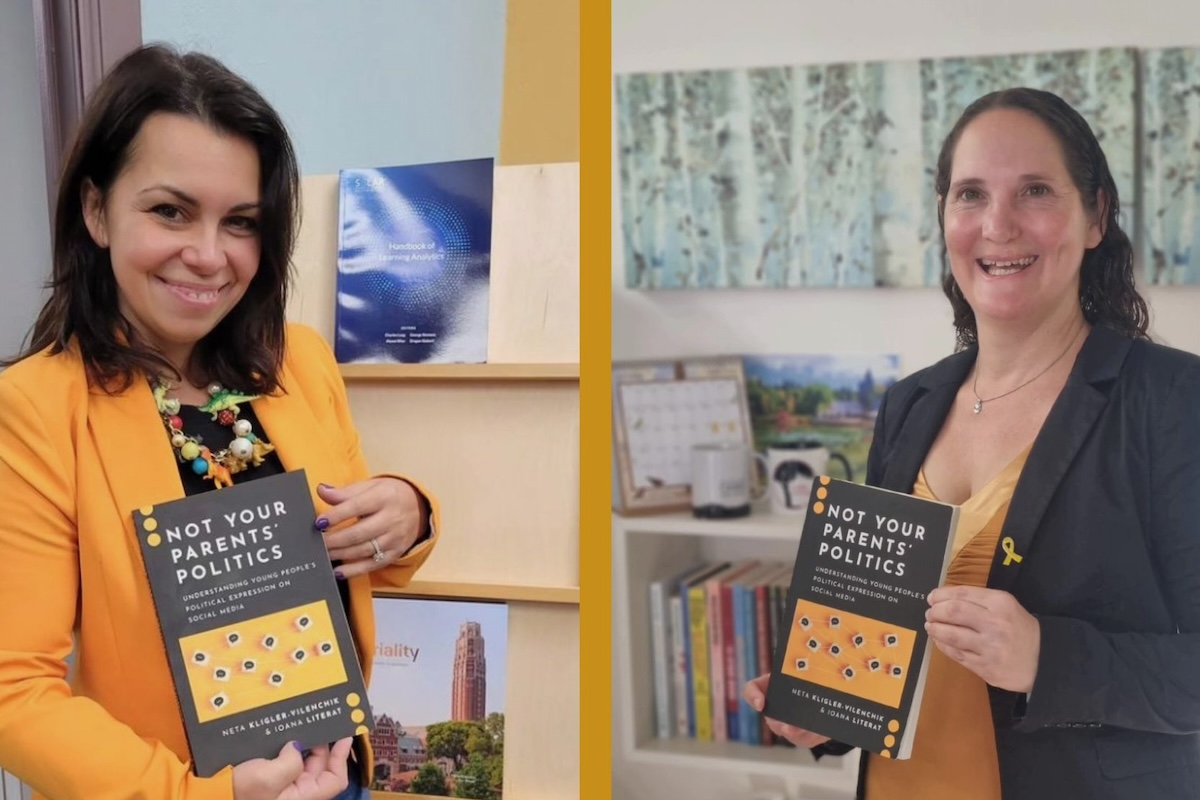When it comes to young people and social media, much of the national conversation centers on the negative impacts platforms have on their users. While a certain amount of concern is valid, media scholars Ioana Literat, Associate Professor of Communication, Media and Learning Technologies Design (CMLTD) at TC, and Neta Kligler-Vilenchik, Assistant Professor of Communication at the Hebrew University of Jerusalem, are far more interested in how young people use social media to express themselves, particularly when it comes to politics. They explore this timely topic in their new book, Not Your Parents’ Politics: Understanding Young People’s Political Expression on Social Media.

Ioana Literat (left) and Neta Kligler-Vilenchik (right) smile and pose with their new book Not Your Parents' Politics. (Photos courtesy of those pictured)
With a background in online creative expression and art, Literat has dedicated her career to understanding how young people express themselves politically online, particularly on TikTok, where nearly 40 percent of young people get their news. Kligler-Vilenchik, who was first focused on youth political expression, noticed the same shift in 2016.
Not Your Parents’ Politics is the culmination of more than eight years of research conducted by Literat and Kligler-Vilenchik, exploring the intersection of online youth culture and politics. It not only makes a case to take young people’s opinions more seriously but also asks, what makes for a “good” citizen in the current climate and how can we support the next generation? “We truly believe in young people's political voice, in their agency and in their collective power,” says Literat.
It comes at a critical time in U.S. politics, where citizens are more polarized than ever and social media platforms play a crucial role in shaping the opinions of young voters, whose humorous political commentary on social media doesn’t conform to the traditional ideal of what political expression should look like: serious, rational and detached. “Young people are not given enough attention, and their use of social media for politics is often denigrated,” says Kligler-Vilenchik.
The Kamala Harris campaign took a different approach, attempting to engage Gen Z on TikTok throughout the election with the viral coconut tree meme and other flashpoints in internet culture. However, young voters turned out to the polls in lower numbers compared to 2020.
“While Harris's campaign effectively utilized social media, especially TikTok, to engage younger voters, online platforms’ influence on electoral outcomes remains complex,” wrote Literat via email after President-Elect Donald Trump won the election. “As we mention in the book when talking about expressive citizenship, social media is great at fostering widespread, passionate, creative political expression among youth, but translating this into votes is challenging, and the emphasis on creative, short-form content may not always align with the depth of information needed for informed voting decisions.”
Literat sees the Harris campaign’s digital strategy with young voters as a reflection of what she and Kligler-Vilenchik have long known: online experiences shape how young people see and interact with the real world offline.
“Although Harris did not win, her campaign — especially her TikTok, where she did so well — will have lasting implications for political engagement,” wrote Literat, who with Kligler-Vilenchik, also analyzes the role of social media in the 2016 election in their book. “Even without immediate electoral impact, campaigns in spaces like TikTok can help young audiences view themselves as part of the political landscape and can contribute to more sustained engagement in the long run.”
This move to meet young voters where they are is a prime example of what can happen when we treat the irreverent and emotionally charged way young people engage in politics online with respect, a central argument in Not Your Parents’ Politics. Instead of discounting what young people have to say because of the way they say it, something Literat believes is harmful to democracy, “we should be amplifying and respecting young people's voices,” she says.
Kligler-Vilenchik and Literat do, however, acknowledge that social media politics have also contributed to increased polarization. “There's a cultural emphasis on wearing your politics on your sleeve,” explains Literat. “[But] political expression is siloed [and] there's very little constructive, cross-cutting exposure, i.e. talking to the other side.” Clearly, being openly political and making politics personal can deepen polarization and yet, Literat sees the potential for healing. “Often we get stuck talking about issues but ultimately, when it comes down to the personal level, we care about many of the same things,” she says. “We all want to have a better life. We all wish for us — our social groups, our loved ones — to be treated well in society.”
Learn more about youth political expression and what makes for a “good” citizen in 2024 with Not Your Parents’ Politics, available for purchase here.
